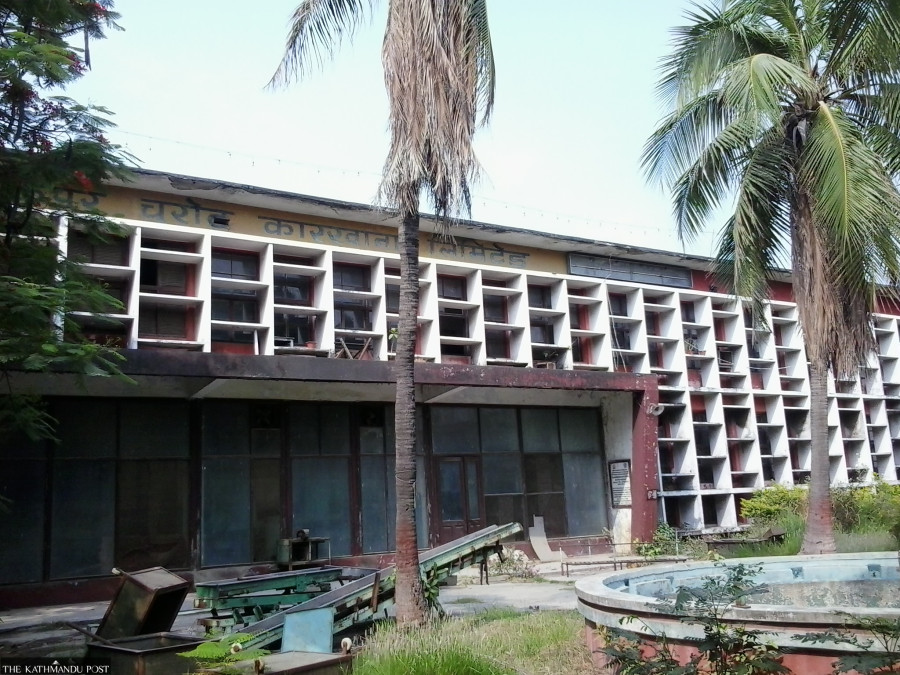Money
Nepal renews push to revive long-defunct factories amid fiscal concerns
Cabinet endorses investment strategy for the shuttered factories. Expert committee to submit a report within three months.
Krishana Prasain
Prime Minister KP Sharma Oli called on the private sector in February to submit concrete proposals for reviving sick industries under a public-private partnership model. Acting on that call, the government has approved an investment management plan to rejuvenate seven long-defunct state-owned enterprises.
A recent Cabinet meeting greenlit the government's plan, which includes developing investment strategies, tax policies, and asset management approaches for the selected industries.
These seven entities—Janakpur Cigarette Factory, Gorakhkali Rubber Industry, Udayapur Cement Factory, Hetauda Cement Factory, Nepal Metal Company, Butwal Yarn Factory, and Nepal Orient Magnesite—are among the most prominent failed industrial ventures the state now seeks to restore.
"A detailed study will be conducted to determine the appropriate operational model for each of these sick factories," said Chhabindra Parajuli, joint-secretary at the Ministry of Industry, Commerce and Supplies. He added that experts will assess the industries’ assets, liabilities, and other operational factors before making final decisions.
In general, a sick industry refers to a financially distressed business on the brink of closure, often due to internal inefficiencies such as poor management and outdated technology or external pressures like shifting market demands or economic downturns.
Parajuli noted that the upcoming study will explore potential revival strategies tailored to each factory’s unique challenges. “The government had previously discussed reviving these industries, but nothing materialised. Now that a high-level decision has been made, we expect progress,” he said.
Under the Public-Private Partnership and Investment Act, 2019, an expert study committee will be formed.
This team, coordinated by Deputy Prime Minister and Finance Minister Bishnu Poudel, will include officials from the finance and industry ministries. The committee is expected to deliver a comprehensive report within three months. Once the report is submitted, the Investment Management Committee will review it and submit a formal proposal to the Cabinet suggesting the most viable revival options.
Prime Minister Oli has emphasised the government’s willingness to cooperate closely with private investors. In February, he reassured that any clear proposals submitted by the private sector would be swiftly facilitated. He also expressed the government’s commitment to amending and introducing necessary legislation to streamline the revival process and support long-term economic growth.
Despite these promises, not all observers are optimistic.
Bimal Wagle, former chief of the now-defunct Public Enterprises Board (PEB), which existed from 2012 to 2018, cautioned that some factories may be impossible to save.
“For example, the Janakpur Cigarette Factory has been shut down for so long that it may no longer be revivable,” he said. However, Wagle believes some other industries could be restored through private sector involvement.
He pointed out that while sectors like tobacco and cement remain competitive, state-run factories have historically failed to keep up. “Government-managed industries often faltered due to political interference and mismanagement. They couldn't survive once Nepal liberalised its economy and allowed the private sector to thrive,” he said.
Wagle highlighted the downfall of Janakpur Cigarette Factory as an example, explaining that it could not compete with the privately run Surya Tobacco.
The issue is not new. As early as 1994, the government established a committee to examine the status of sick industries, aiming to revitalise them and increase the manufacturing sector’s contribution to Nepal’s gross domestic product (GDP).
Since then, various committees and task forces have been formed, yet none of the industries has been successfully revived.
Progress was made under former industry minister Nabindra Raj Joshi, who served from August 2016 to September 2017. During his tenure, Nepal Drugs was successfully revived, and work began to rejuvenate other defunct enterprises like the Birgunj Sugar Factory, Gorakhkali Rubber Industry, Nepal Orient Magnesite Company, and Butwal Yarn Company.
However, with the change in government, those efforts were stalled.
Although politicians frequently advocate for promoting public-private partnerships in Nepal, there has been little tangible progress in reviving failing state-owned industries.
Nepal’s public enterprises fall into six broad categories: industrial, trading, service, social, public utility, and financial. However, many of these institutions have become fiscal liabilities.
According to the finance ministry's 2024–25 fiscal policy statement, state-owned enterprises impose a significant financial burden on the treasury. These losses, stemming from years of inefficiency and mismanagement, now threaten the country’s fiscal stability.
As the government renews its efforts to bring back these long-closed factories, the success of this initiative may depend less on plans and more on political will, transparent execution, and the real inclusion of the private sector, said Wagle, the former government secretary.




 16.12°C Kathmandu
16.12°C Kathmandu













